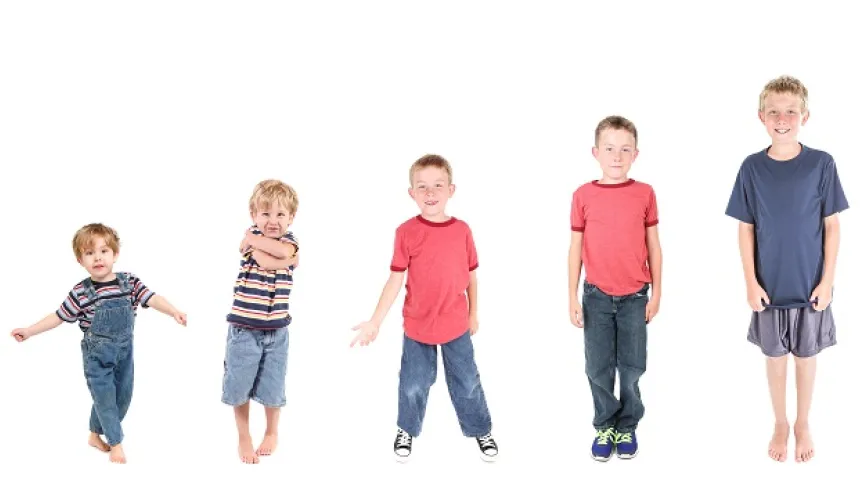
‘Polish children are shorter than their peers from other countries in our region,’ says Professor Anna Fijałkowska from the Institute of Mother and Child in Warsaw.
She adds: ‘This surprised me, because so far we have focused only on the BMI and we knew that Polish children were gaining weight the fastest in Europe.’
In the 1990s, children living in cities were clearly taller than children living in the countryside. Since 2000, this gap has started to close around the world. The exception is Sub-Saharan Africa, where such changes still have not taken place - children in cities continue to develop better, they are healthier and have a better start in adulthood. These conclusions were formulated on the basis of the results of the study published in Nature, based on data from 200 countries (including Poland).
More height in adolescence positively affects human development, including the reduced risk of civilization diseases in later stages of life. BMI (body mass index) is the opposite. The higher a child's BMI during growth and puberty, the greater the risk of various diseases.
Scientists collected data on the height and weight of children aged 5-19, living in cities and in the countryside. In total, 2,325 population studies were used. Several scientific institutions from Poland were involved, including the Institute of Mother and Child in Warsaw.
'I was surprised that Poland was in the lower ranges of our geographic region. Children in Poland are shorter in comparison to their peers from other countries in the region, not to mention children in Western countries or Scandinavia', says Professor Fijałkowska.
The study presents data for 13 countries in Central and Eastern Europe. Only children from Albania and Macedonia are shorter than Polish children living in cities. On the other hand, children from Bulgaria, Romania, Albania and Macedonia are shorter than Polish children living in the countryside.
When asked about the possible reasons for these results, Fijałkowska says that it is difficult to draw clear conclusions, because Poland has not yet carried out longitudinal studies of different cohorts of children (the same group is monitored for many years). She adds that there is one factor that has been well researched recently - the diet.
'As part of cooperation with WHO, we are among 40 countries that participate in the COSI (Childhood Obesity Surveillance Initiative) project. So far, we have taken part in three editions (2016, 2018, 2021). Thanks to this, we know the nutritional differences between children living in cities and in the countryside,’ says Fijałkowska.
As many as 67% of children in cities and 63 percent children living in the countryside eat fresh fruit every day. Vegetables are consumed by 83% of children in cities, and 75% in the countryside. Sweet drinks are consumed three times a week by 28% children in cities and 34 percent children in the countryside.
'There are still dietary differences between cities and the countryside. But these differences are blurring to the disadvantage of the city. The cities are worse than they used to be. The popularity of fast food is growing and there is a problem with polluted air. While we do not know the impact of air pollution on growth, if someone has asthma, their development is definitely worse,’ says Fijałkowska.
She also emphasises that only a few percent of children in Poland are physically fit for their age. When asked whether Poland's economic status compared to other countries in the region could affect bad eating habits, she denies it.
'The low position of Polish children in terms of height is not due to poverty. Compared to other countries, we simply care less about our diet. When we combine this with the fact that Polish children (especially boys) are gaining weight the fastest in the region, it paints a consistent image.
'Both groups of children have increasing amounts of screen time at the expense of time spent outdoors. This, in turn, is compounded by migrations and a change in the social structure - rich city dwellers move to the outskirts of the city. The villages outside the cities no longer resemble traditional villages.’
According to Fijałkowska, the observed phenomenon, can be partially explained by the well researcher mechanism of societies getting richer.
She adds: ‘This is a well known phenomenon - when a society starts to get richer, at the beginning we observe an increase in unhealthy behaviour: people get fat, fall into an unhealthy lifestyle. And then they bounce back. We learned it very well on the example of the behaviour of the Scandinavian community.’
The expert also shares information about the planned project of a long-term study of Polish children. However, she mentions the difficulty in gaining the trust of parents who must consent to their child's participation in the study.
'We want to build a long-term project to observe the population in particular age groups regularly, over the course of many years. It would be something along the lines of projects run by the Americans and the British. We want to see how Polish children develop and what factors influence it. We will conduct basic medical examinations, measure, weigh, place them in a social context. The research will be anonymous. However, gaining the trust of parents is still a big barrier,’ says Fijałkowska.
PAP - Science in Poland, Urszula Kaczorowska
uka/ bar/ kap/
tr. RL













